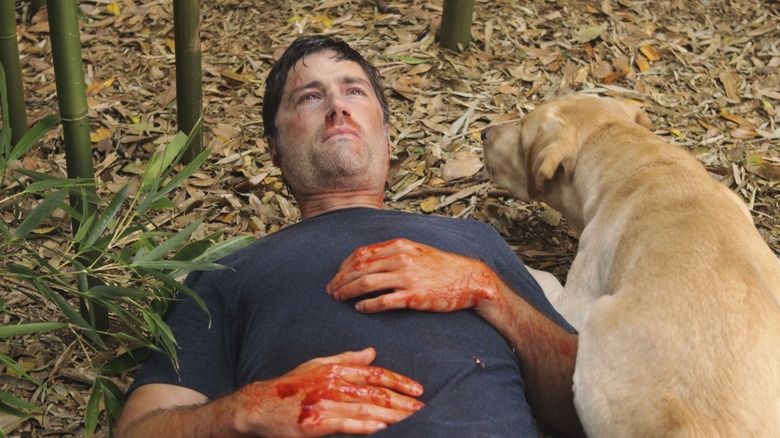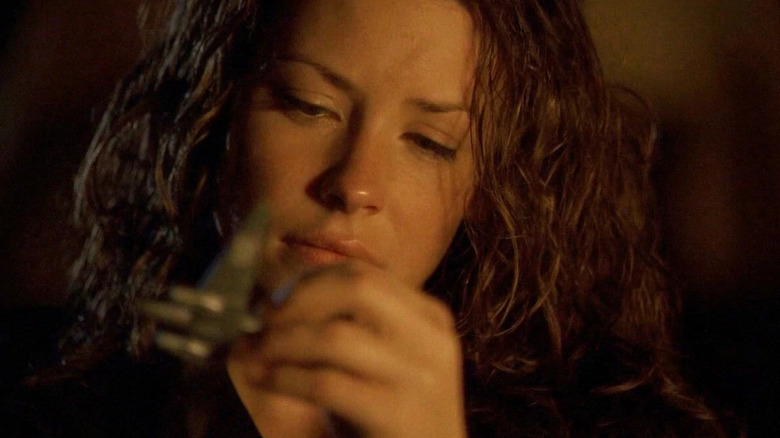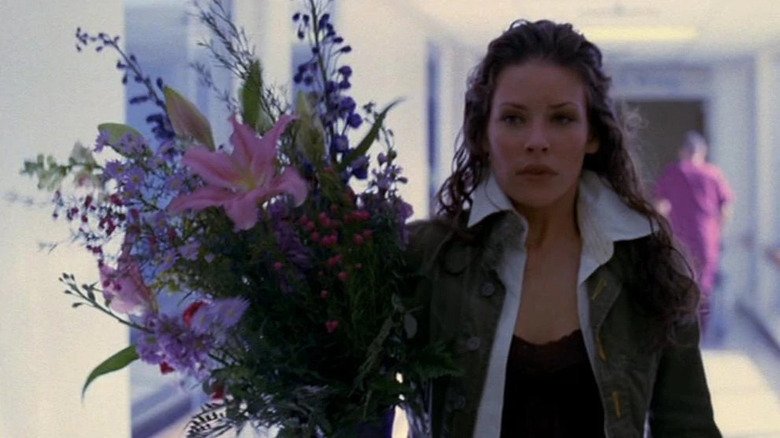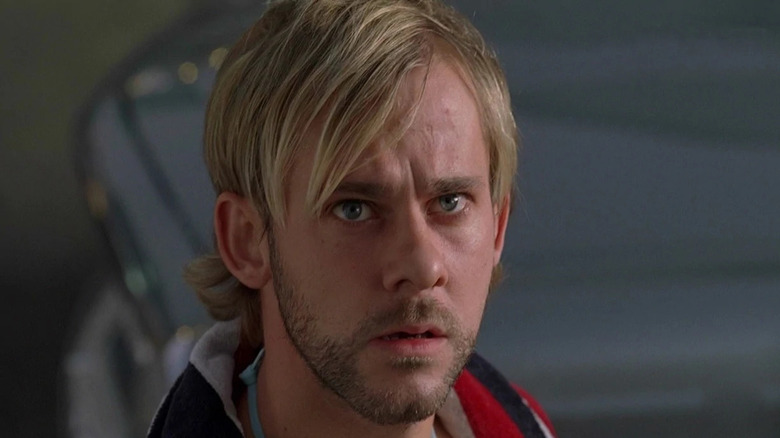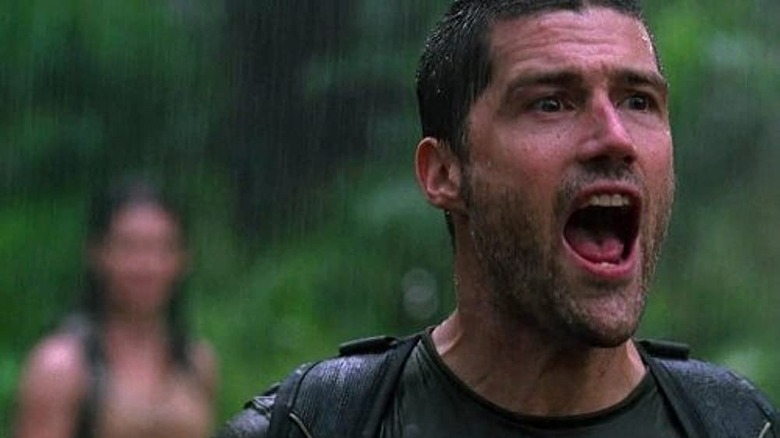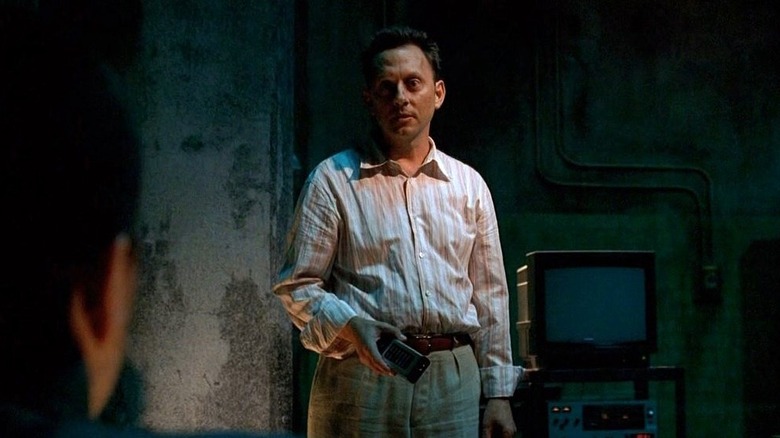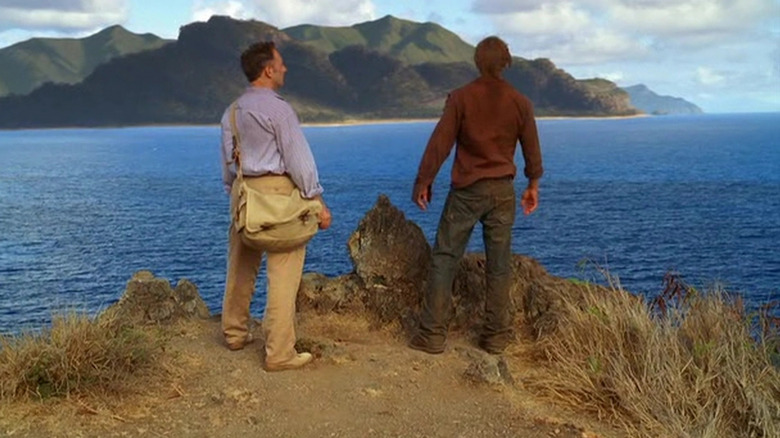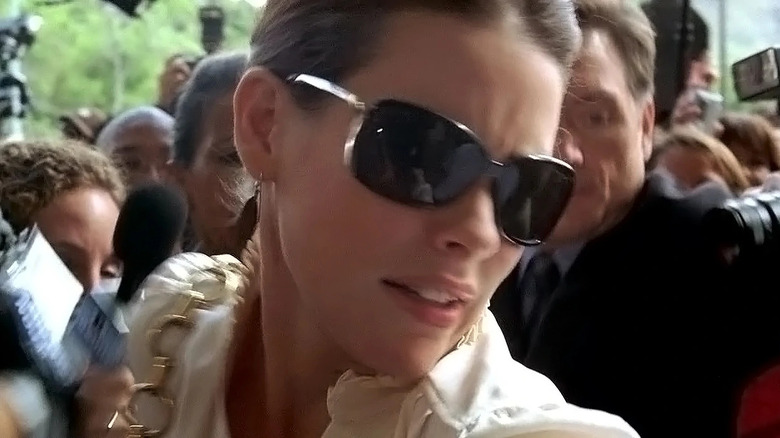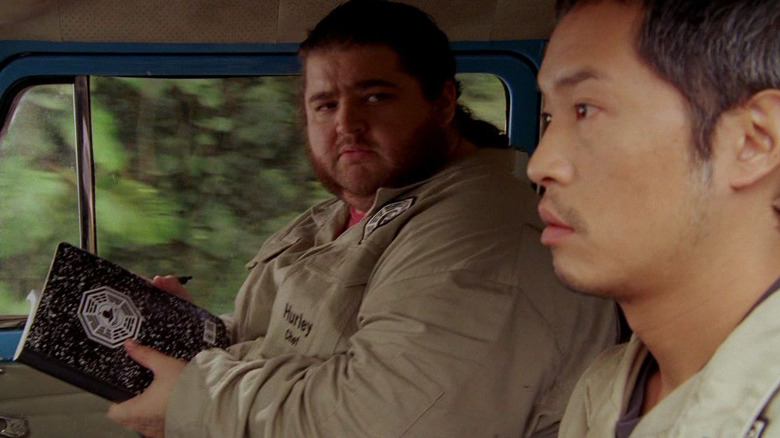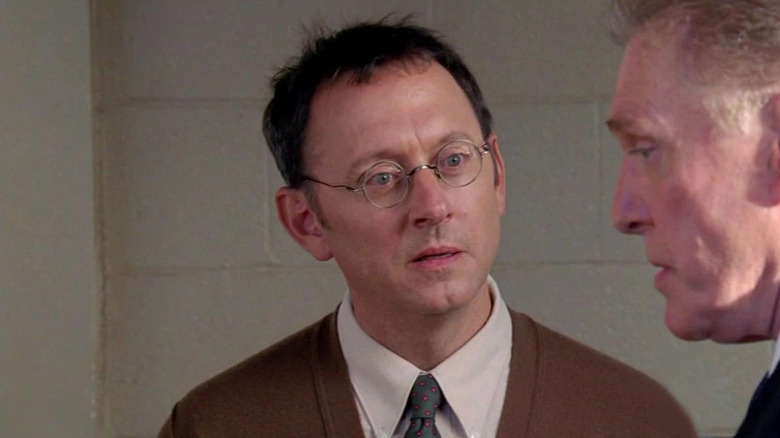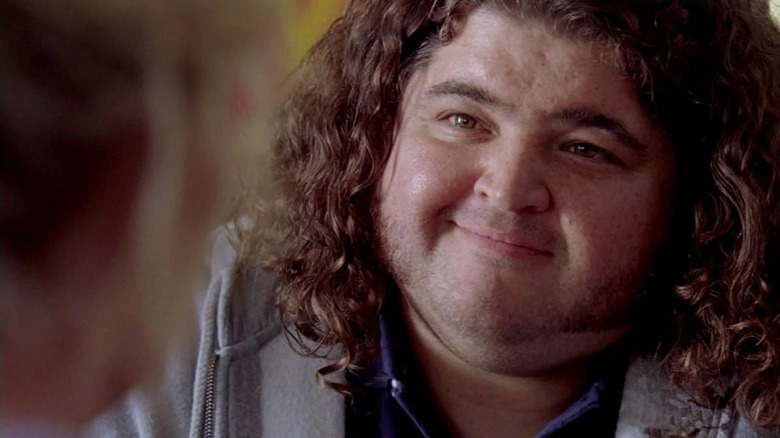The 10 Most Underrated Episodes Of Lost
Long before the days of "Breaking Bad," "Game of Thrones," and "Stranger Things," "Lost" was the "must-see" television show that everyone was obsessed with. You simply had to tune in to ABC each week to see the latest shocking plot twist. That shows how radically the entertainment industry has changed. Today, blockbuster shows with budgets that rival feature films are just as high profile as Hollywood's superhero movies. "Lost" set the precedent for the future of entertainment.
In addition to the stunning spectacle of the series, "Lost" employed some creative talents who would go on to be incredibly influential. The series was developed by Damon Lindelof, who would later create both the HBO sci-fi drama "The Leftovers" and the inventive reworking of "Watchmen." The pilot of "Lost" was directed by J.J. Abrams, and the brilliant score from Michael Giacchino made the show feel just as epic as anything that you'd see on the big screen.
The legacy of "Lost" is interesting. While the season finale, "The End," still divides fans, the show is best remembered for the grip that it had on popular culture. If you only watched "Lost" to follow the various twists and turns, you may have been underwhelmed. If you simply enjoyed getting to spend time with these characters, then the series may have been more rewarding. These are the 10 most underrated episodes of "Lost."
Whatever the Case May Be (Season 1, Episode 12)
Most "Lost" fans would agree that the show's first season is its best. While later seasons got overly complicated, Season 1 found the perfect combination of character-building and action. The brilliant nonlinear structure that Damon Lindelof designed allowed the show to analyze each of the protagonists by revealing critical moments from their pasts. While episodes like "Walkabout" and "Deus Ex Machina" are often cited as standouts, "Whatever The Case May Be" does a great job at exploring Kate Austen's (Evangeline Lily) guilt and inventiveness.
"Whatever The Case May Be" plays upon the awkward romantic triangle between Kate, Jack Shepard (Matthew Fox), and Sawyer Ford (Josh Holloway). While later episodes would explore the mistakes that Jack and Sawyer made in the past, "Whatever The Case May Be" puts Kate in an awkward position in which she struggles to admit the truth. She is forced to open a suitcase that has a tie to her past. Kate has a heartbreaking breakdown when Jack confronts her. It's nice to see Jack show no sympathy for Kate after trying to flirt with her for the first part of the season.
Jack Bender is one of the show's best directors, and he delivers an inventive opening sequence in which Kate and her fellow robbers stage a heist. It has all the cinematic energy and excitement of a Michael Mann film.
Born to Run (Season 1, Episode 22)
Both praise and criticism can be leveled at "Lost" for how it handles its "mystery box" elements. In the later seasons, the never-ending series of questions irritated fans by not providing any answers. While a certain amount of intrigue was necessary to keep the momentum going, there also needed to be revelations. The Season 1 episode "Born to Run" satisfied some lingering questions without seeming like an expositional dump.
Given Kate's criminal history, flashbacks to Kate's backstory are inherently interesting. The scenes with her that take place in the past are more action-oriented. Although "Born to Run" features a tense shootout during its final moments, the rest of Kate's story is more emotional. Getting to see Kate's relationship with her ex-boyfriend, Tom Brennan (Mackenzie Astin), is heartwarming — until it becomes absolutely devastating. There are some fun details, including a moment when Kate and Tom dig up a time capsule that they buried back in 1989. Apparently, Kate has always had a knack for playing around with time!
The episode also includes the important revelation that Walt Lloyd (Malcolm David Kelley) was the one who hijacked the raft. This allows for a tender moment between Walt and his father, Michael (Harold Perrineau), that makes their journey in Season 2 more emotionally effective. Michael can be an irritating character, but Perrineau shines in these intimate moments between father and son.
Fire + Water (Season 2, Episode 12)
As one of the most parodied episodes of the series, "Fire + Water" is best known for the moment when Driveshaft performs "You All Everybody" in a commercial in which they all wear diapers. While this isn't one of the finer moments, the rest of the episode does a good job of fleshing out Charlie Pace (Dominic Monaghan). Monaghan is an inherently funny actor. He brought a great sense of humor to the "Lord of the Rings" films, and he gets a lot of fun one-liners on "Lost." However, he shows in "Fire + Water" that he can go to dramatic lengths to show Charlie's familial struggles and trauma.
The flashbacks featuring a young Charlie playing piano are critical to tying his love of music to a disturbing moment from his childhood. Because of their impoverished living environment, Charlie's family plans to take advantage of his musical talent to improve their circumstances. This effectively shows why Charlie is willing to "sell out" when he gets older. He's been forced to use music as a source of income.
The scenes with Charlie and his brother and bandmate, Liam (Neil Hopkins), are quite moving. Charlie feels an obligation to look after Liam because of his heroin addiction, which leads him to make some unfortunate decisions. These flashbacks are beautifully interwoven with the scenes of conflict in the present when Charlie takes Claire Littleton's (Emilie de Ravin) infant son, Aaron.
S.O.S (Season 2, Episode 19)
Season 2 was much less action-packed than its predecessor. While this leads to a few dull patches, some beautiful moments come out of the slower pacing. "S.O.S." features a heartbreaking flashback that reveals what Rose Henderson (L. Scott Caldwell) and Bernard Nadler (Sam Anderson) were up to before they boarded the pivotal flight. It's one of the sweetest love stories in "Lost." Seeing a happy couple that truly cares for each other is rare on this show.
"S.O.S." does a great job of showing the two characters' devotion. After discovering that Rose has terminal cancer and will only live for another year, Bernard swears to find a cure by seeking out faith healers. It's clear that Bernard is fighting a losing battle, but it's essential to his character arc that he refuses to admit defeat. This is very moving, but Rose's point of view also makes sense. She wants her husband to take advantage of the time that they have left, so she chooses to deceive him. This complicates Rose's actions before the flight and makes her survival even more miraculous.
Elsewhere in the episode, there is a gripping moment when Jack interrogates Henry Gale (Michael Emerson) about the hatch. Emerson's delightfully elusive performance helps perpetuate the season's mystery. It's interesting to watch Jack grow infuriated as Gale tells him that the Other will not trade Walt.
The Glass Ballerina (Season 3, Episode 2)
After the electrifying Season 3 premiere, "A Tale of Two Cities," "Lost" resumed a slower pace with the subsequent installment "The Glass Ballerina." The complex romance between Sun-Hwa Kwon (Yunjin Kim) and Jin (Daniel Dae Kim) is one of the more interesting marriages in "Lost." Sun feels helpless and ignored by Jin, and they are trapped in traditional South Korean gender roles. Jin changes his behavior when he recognizes that his wife is in pain. They are one of the rare screen couples who come into conflict, and you can empathize with both characters.
Sun has an affair with Jae Lee (Tony Lee), but it's not out of anger toward her husband. She feels neglected and is in search of a genuine connection. The scenes between Sun and Jae are more tender than scandalous. Even within the confines of network television, "Lost" shows intimate moments. At the same time, this complicates Sun's revelation that she is pregnant. That sets her up with an important decision. Jin may not be the father, and that would shatter his pride.
Kim is phenomenal in the scenes in which Jin tracks down Jae. Despite his rage, Jin isn't a murderer, and it's important to see his inherent empathy before his actions on the island. These flashbacks do a great job of making the storyline during which Jin and Sayid Jarrah (Naveen Andrews) are sailing into danger in the present more exciting.
Every Man for Himself (Season 3, Episode 4)
"Every Man For Himself" is a shot of adrenaline from beginning to end. Any episode spotlighting Sawyer's life as a con man before crashing on the island is bound to be exciting, but "Every Man For Himself" complicates his worldview by showing him meeting his match. Despite Sawyer's history of deception, he falls for a trick when Linus manages to convince him that he has a lethal pacemaker that prevents him from leaving the island.
This twist is only effective because we see what lows Sawyer is willing to sink to in the flashbacks. After framing the wealthy Munson (Ian Gomez), Sawyer cheats his way out of prison by informing the warden (Bill Duke). Holloway does a great job of showing Sawyer's confidence during these exchanges. Sawyer's rugged charisma easily deceives people.
The interplay between Sawyer and Linus is fascinating. Linus plays on Sawyer's affection for Kate and gets him to accept his lies. Sawyer needed to believe that Linus was sincere in his threats, and Emerson effectively shows how impenetrable the character is. At this point in the series, we didn't know a whole lot about Linus' backstory, so seeing how manipulative he can be makes him even more compelling. Emerson characterizes Linus as someone who is almost divorced from emotion. However, "Every Man For Himself" also shows that Linus isn't as cruel as he seems.
Eggtown (Season 4, Episode 4)
The forward flashes in Season 4 help make it one of the stronger installments. Handling a time travel storyline without becoming incredibly confusing is a real challenge, but Damon Lindelof and his team of writers lay out the timeline in a way that makes sense. The storyline featuring the "Oceanic Six" after their rescue challenges viewers' perception of the show. The characters manage to still have interesting journeys after being rescued from the island. "Eggtown" ends with a cool reveal about Aaron and features some of the strongest interactions between Jack and Kate.
In the forward flashes, Kate is finally brought to trial for all of the crimes that she committed before she was on the island. This is an interesting way to show that, despite her heroism, Kate can never escape her checkered past. Lily brings out Kate's sense of guilt when Jack confronts her. He shows his dedication by claiming under oath that she saved the other passengers, and Kate is overwhelmed by his affection. It's hard to watch Jack undergo such a personal crisis, even after his rescue. We know that his past has been challenging because of his divorce and the death of his father.
Any scenes including Daniel Faraday (Jeremy Davies) are a treat, as he is the show's strongest link to the time travel story. That sets up some interesting details surrounding his character in the subsequent episode "The Constant."
Some Like It Hoth (Season 5, Episode 13)
The Season 5 episode "Some Like It Hoth" is the only installment centering on Miles Straume (Ken Leung). While Miles didn't play as prominent a role in the later seasons, it was important to show his relationship with his father, Dr. Pierre Chang (François Chau). Dr. Chang was shrouded in mystery up until this point, so "Some Like It Hot" explores some of his plans before he filmed the chilling orientation videos. That showed how the Dharma initiative made it challenging for all of its employees to have a normal life.
The most emotional aspect of the episode is the relationship between Miles and Hurley Reyes (Jorge Garcia). Even though Hurley is usually a source of comic relief, he's also one of the most caring characters. Hurley's frank views on life and morality are heartwarming during the darker moments. We see Hurley's inherent empathy when he and Miles discuss their relationships with their fathers.
As the title suggests, the episode features many references to "Star Wars." During Hurley and Miles' conversation about their fathers, Hurley compares them to Luke Skywalker and Darth Vader. There's also a fun callback to an earlier episode in which Hugo writes the screenplay for "The Empire Strikes Back" from memory so he can give it to George Lucas. Damon Lindelof might be telling more "Star Wars" stories very soon!
Dr. Linus (Season 6, Episode 7)
Often, Ben is one of the most sadistic characters on "Lost," but Season 6 reveals that he wasn't always that way. "Dr. Linus" features a surprising flashback in the sideways timeline in which Ben is a timid high school history teacher. In a storyline that seems like it may have inspired "Breaking Bad," Linus uses his manipulative ways to blackmail his boss, Principal Reynolds (William Atherton). However, we see that Linus isn't quite willing to steal the principal's position for himself if it means harming someone he cares about. Regardless of his actions, Linus' loyalty to his friends is never in doubt.
In the 2004 timeline, Linus is encouraged to see that his highly intelligent student Alex Rousseau (Tania Raymonde) is on the road to success. Linus' job seems very grueling, so it's nice to see him take pride in one of his students' achievements. The episode also gives us more than enough reason to hate Reynolds, as he discounts Linus' interest in his history club at every turn. It's rewarding to see Linus prove that Reynolds is having an affair with the school's nurse. It's also nice to see Linus finally use his deceptions for good.
However, Reynolds threatens to deny Alex a positive letter of recommendation to her dream college. With his leverage compromised, Linus is tragically forced to return to his day job. This experience emphasizes Linus' awareness of the qualities that make a good leader.
Everybody Loves Hugo (Season 6, Episode 12)
Has an episode title ever been so accurate? "Everybody Loves Hugo" was a great way to spotlight Hurley in the final season, and allows him to reflect on everything that he has experienced. Hurley's insights are often wiser than they are given credit for, and it's fitting that the parallel timeline finally starts to make sense because of him. It's rewarding to see Hurley finally get a sense of happiness after all the pain that he has endured.
The beautiful scenes between Hurley and his departed lover, Libby (Cynthia Watros), are touching. It becomes clear that the events in the 2004 parallel timeline are in some version of the afterlife. It's also a great chance to see this couple together again after tragedy drives them apart. It's also nice that Hurley finally has a bright future ahead of him, as he seems to be a fairly successful businessman. Even the expositional moments between Hurley and Desmond Hume (Henry Ian Cusick) show the compassion of both characters, as Desmond encourages Hurley to believe Libby's statements about the island.
"Everybody Loves Hugo" is a very well-paced episode. While the parallel storyline is a little bit slower, the events in 2007 are gripping. Between the death of a major character, the explosion of the "Black Rock," and an epic brawl between Desmond and the Man in Black, "Everybody Loves Hugo" barely gives the audience time to catch their breath.
